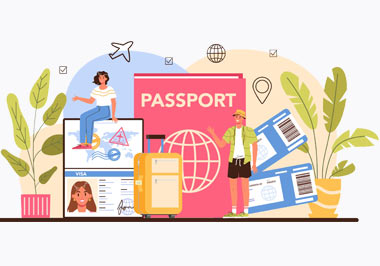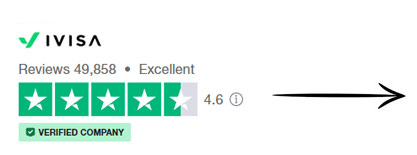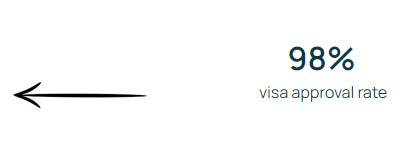What do you need to travel to India?
Find out all about the formalities for travelling to India: online visas, passports, health requirements and restrictions.
 Fast: Simplified, efficient process.
Fast: Simplified, efficient process.
 Security: information is protected.
Security: information is protected.
 Reliability: 98% approval rate.
Reliability: 98% approval rate.
 Assistance: 24/7 customer support.
Assistance: 24/7 customer support.


India is a popular and diverse tourist destination, brimming with cultural riches, breathtaking scenery and thousands of years of history. However, before you set off for this marvellous land, it's crucial to understand the requirements and formalities for travelling to India. Indeed, the preparation of your trip, including obtaining the appropriate documents, can greatly influence your experience in India. On this page, we will guide you through the essential requirements for travelling to India, emphasising the importance of knowing this information before you leave.
Entry requirements for India: in brief
- Passport: Valid for 6 months after the date of return and with at least 2 blank pages.
- Visa: Required for all British travellers. Two types of electronic visa (e-Visas) are available: the e-Tourist Visa (tourism) and the e-Business Visa (business).
- Vaccinations: A yellow fever vaccination certificate is compulsory for travellers from countries where yellow fever is present. Other vaccinations may be recommended, such as those against hepatitis A and B, typhoid and rabies.
- Travel insurance: Travel insurance is strongly recommended to cover medical expenses, medical evacuation, repatriation, etc.
- Other documents: Return or onward air ticket. Proof of sufficient funds to cover your stay in India.


Obtaining a visa to travel to India is now easier thanks to the online electronic visa application system, known as e-Visa. This system has been introduced to facilitate the process and offer greater convenience to travellers.
The e-Visa offers several significant advantages. Firstly, it allows you to apply for a visa without having to physically visit an Indian embassy or consulate. You can simply complete the application form online and submit the required documents via the official portal.
As far as the different categories of visa available are concerned, India offers various types of visa to suit the needs of travellers. The most common categories include tourist, business, medical and conference visas. There are also other relevant visa categories, such as the visa for volunteers, journalists, students, etc.
To obtain a visa online, certain conditions and requirements must be met. Firstly, you must have a valid passport with sufficient validity to cover your stay in India. Make sure you also have blank pages in your passport for entry and exit stamps.
As well as your passport, you will need to provide additional documents, such as return tickets or a confirmed travel itinerary. You will also need to prove that you have sufficient financial means to support yourself during your stay in India. A recent passport photograph and a completed online application form will also be required.
It is important to note that the processing time for an online visa may vary. In general, applications are processed within a reasonable time, but it is advisable to submit your application with sufficient time before your planned trip. In addition, visa processing fees will apply. Fees may vary depending on the length of stay and the visa category chosen.
To travel to India, British nationals must comply with a number of passport formalities to ensure smooth entry into the country. Here are the essential points to bear in mind:
Firstly, your passport must be valid for at least six months from the date of your arrival in India. This requirement is designed to prevent any potential validity problems during your stay. In addition, your passport must contain at least two blank pages. These pages are required for entry and exit stamps issued by the Indian authorities.
When you arrive in India, you will need to present your valid passport together with the e-Visa printed or electronically on your device. This will facilitate entry formalities and allow you to begin your stay without complications.
Although it is not a formal requirement, it is a good idea to make photocopies of your passport. Keep these copies separate from the originals in case they are lost or stolen.
To travel to India, British nationals must comply with certain health and vaccination formalities to ensure their safety and well-being during their stay. Here are the main points to bear in mind:
Take your up-to-date international vaccination booklet (also known as the yellow booklet) with you, including the recommended vaccinations and those against COVID-19.
In addition to the visa, there are other important formalities and documents to consider when travelling to India.
First of all, make sure you have a valid passport with sufficient validity. Most travellers need to have a passport valid for at least six months from the date of intended entry into India. Also make sure you have blank pages in your passport for entry and exit stamps.
As far as health is concerned, it is essential to check the vaccination requirements recommended for India. For example, some parts of India may require proof of vaccination against yellow fever. In addition, in the event of a pandemic or epidemic, vaccination requirements may apply.
It is advisable to apply for an India visa as soon as you have planned your trip and know your departure and arrival dates. It is best to submit your visa application online several weeks in advance to allow sufficient time for processing and to avoid any last-minute problems.
Processing times for online visa applications may vary depending on various factors such as the time of year, the category of visa requested and the workload of the relevant authorities. In general, we recommend that you submit your visa application at least 4 to 6 weeks before your planned date of departure.
Restrictions on travel to India may vary depending on developments in the epidemiological situation and the regulations put in place by the Indian government. Here is some general information on current restrictions on travel to India:
To sum up, travelling to India requires you to take into account certain requirements and formalities. Obtaining a visa online via the e-Visa system offers a convenient and simplified method of obtaining your travel authorisation. There are different categories of visa, depending on the purpose of your trip. Make sure you meet the common requirements, such as a valid passport, return tickets, financial proof and a recent passport photo.
In addition to a visa, it is crucial to have a valid passport with sufficient blank pages for entry and exit stamps. Make sure you also comply with health requirements, such as recommended vaccinations, by checking the information with the relevant authorities. Don't forget to bring other important documents such as proof of hotel booking, a detailed travel itinerary and travel insurance.
It is always advisable to check the latest information with the relevant authorities or Indian embassies before travelling. In this way, you can ensure that you have all the necessary documents and that you meet the conditions required to make the most of your trip to India.
Find out if your question has been answered in the list below
There are several categories of visa for travel to India, including tourist, business, medical, conference and other relevant categories. Each visa category has its own specific conditions and requirements depending on the purpose of travel. It is important to choose the appropriate category when applying for your visa online and to provide the relevant required documents.
Processing times for online visas can vary, but in general can take several days to a few weeks. It is advisable to submit your online visa application several weeks in advance to allow sufficient time for processing. However, processing times may be shorter for some visa categories, while others may require a more in-depth assessment, which may extend the processing time.
Apart from the COVID-19 pandemic, it is advisable to check health requirements before travelling to India. This may include recommended vaccinations, such as yellow fever in certain regions, as well as other health precautions. It is advisable to check travel recommendations and health requirements with the relevant authorities, such as health departments or embassies, for the most up-to-date information.